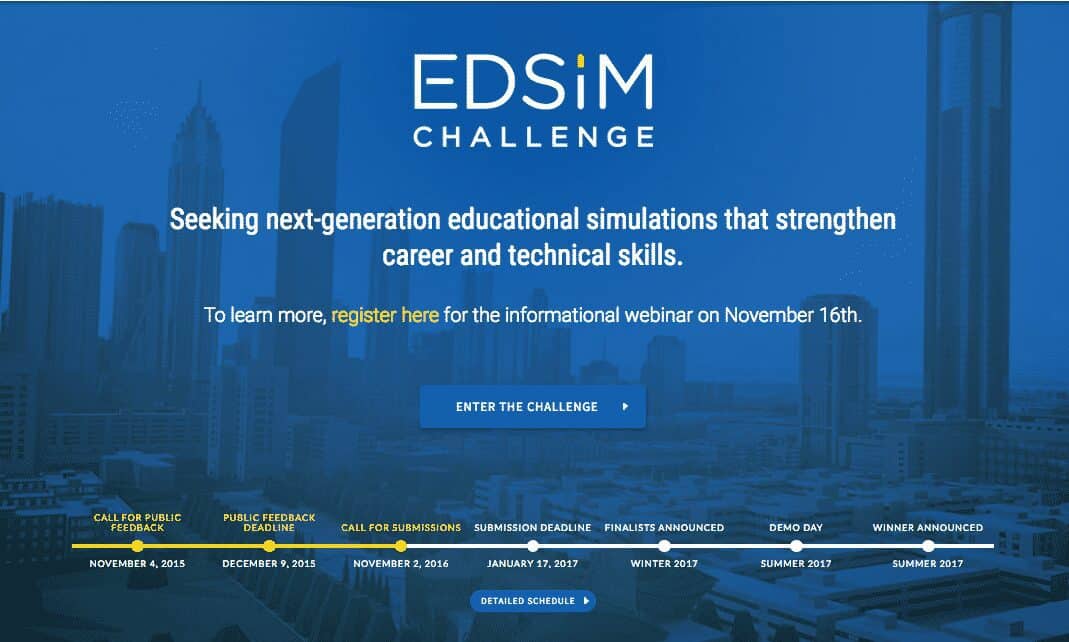Are you ready to shape the future of learning? The U.S. Department of Education announced a $680,000 EdSim Challenge this week for the development of virtual and augmented reality, 3D simulations, and multiplayer video games to prepare students for the 21st century workplace. Not surprisingly, the EdSim challenge is sponsored by IBM, Microsoft, Oculus and Samsung. All are major players in building the next generation AI, VR and AR technologies that will power these experiences.
VR and AR EdSim Challenge
The EdSim Challenge hopes to inspire developers to create virtual and augmented reality educational experiences that employ game dynamics. The goal is to create immersive experiences that will transfer academic and technical skills and at the same time provide for embedded assessment. According to research published in the U.S. Department of Education announcement, simulation-based learning provides students with enriched experiences in information retention, engagement, skills acquisition, and learning outcomes. Check the short video below.
Criteria and Timeline
Participants need to submit their simulation concepts by Jan. 17, 2017. The Challenge has two sets of criteria. To determine the finalist the judges are looking for:
- Learning Outcomes
- Engagement.
- Commitment
- Implementation Strategy
- Scalability and Expansion
For more information, check the EdSim grant criteria. The finalist teams will be announced in winter 2017. Up to five finalist teams will be chosen by a judging panel to receive $50,000 each and advance to the Virtual Accelerator. In Spring 2017, finalist teams will participate in Virtual Accelerator where they will received coaching and mentorship from experts in technology and education followed by Innovator’s Boot Camp. The Boot camp will focus on design, development, and innovation with the goal to improve their projects.
For the final round the challenge will put a greater emphasis on the user experience and interface as well as an Implementation Strategy and Long-Term Vision. The winners will be announced in summer 2017 based on the following criteria.
- Learning Outcomes
- Engagement – User Experience
- Engagement – User Interface
- Commitment
- Implementation Strategy
- Long-term Vision
The EdSim challenge process will run until Summer 2017 with the timeline below. The Challenge is timely as VR and AR technology has moved from the experimental stage to a variety of VR headsets at different price points on the market. Mobile AR and VR immersive experiences are now within reach of students and faculty and major tech and media companies are pushing content development.

The Future of Learning
The potential for Virtual and Augmented reality paired with AI to enhance learning offers abundant possibilities. Augmented Reality applications can help student see learning objects in 3D and guide them in understanding difficult concepts. AR visualizations will become integral part of the learning process. In the near future, AR glasses will make this process even more seamless as visualizations will require only a voice command or tap on our eyewear.
Virtual Reality will make the world’s best museums or marine life at the bottom of the ocean instantly accessible. In addition, the use of hand controllers in VR will help students master practical skills through visual and haptic feedback. Virtual Reality and simulation environments will integrate experiential learning across the disciplines.
As the technology improves, students will receive immediate feedback on their performance. Embedding game dynamics in educational experiences will allow students to master skills and progress at their own pace. AI engines and eye-tracking software will transform how students interact with immersive environments.
We’re excited to see the possibilities in the EdSim challenge. It’s time for developers to work on building immersive experiences that will power the future of learning. If you’ve got the skills, check out the EdSim challenge. There’s a significant monetary reward, but the real prize is how you may shape the future of learning.
Maya Georgieva is an EdTech and XR strategist, futurist and speaker with more than 15 years of experience in higher education and global education policy. Her most recent work focuses on innovation, VR/AR and Immersive storytelling, design and digital strategy. Maya actively writes and speaks on the topics of innovation, immersive storytelling and the future of education and consults organizations and startups in this space.

